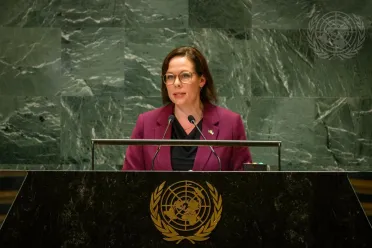Statement
Statement summary
MARIA MALMER STENERGARD, Minister for Foreign Affairs of Sweden, said: “Sweden’s strong defence of international law, including the UN Charter, is based on the understanding that both our own security and that of other countries depends on it.” Her country’s steadfast support for Ukraine’s efforts to restore its sovereignty and territorial integrity will continue for as long as it takes, she emphasized, noting that Sweden and Finland chose to join the North Atlantic Treaty Organization (NATO) as a direct response to the Russian Federation’s full-scale invasion. “For Sweden’s part, this represents a truly historic change, ending 200 years of military non-alignment,” she said, stressing that it is every State’s right to choose its own security policy path. “Sweden’s NATO membership gives us a new, crucial platform to defend the fundamental values of our foreign and security policy,” she added.
Sweden has consistently supported countries struggling for liberty, independence and democracy, particularly in Africa, and will continue to be an engaged partner of African countries, she said. Concerned about the situation in Sudan where over 10 million people have been displaced, “which roughly corresponds to the entire population of my own country”, she called for safe, rapid and unhindered humanitarian access, an immediate ceasefire and negotiations ensuring a return to civilian rule. Sweden remains a key partner and donor of UN humanitarian assistance, as well as of peacekeeping and peacebuilding efforts, including in Yemen. It is among the largest core donors to UN agencies and other organizations working to mitigate the immense suffering of Gaza’s civilian population. She underscored Israel’s right to defend itself and demanded that the hostages be released. A ceasefire would provide space for reaching a diplomatic settlement, she said, adding: “In the longer term, Sweden — like the EU and the United States — believes in the idea of a two-State solution...”
Also a generous donor of development assistance, Sweden is expediting implementation of the SDGs. To that end, she called for strong national ownership in partner countries, broader cooperation among donor countries and a stepped-up fight against corruption. Echoing the Secretary-General's concern about rising global opposition to gender equality, she underscored that countries that stand up for women’s and girls’ rights are not only champions of freedom and human rights, but also benefit from broad labour market participation and economic growth. “Everyone must be able to live safely and freely...,” she emphasized, noting her Government’s work on an action plan for equal rights and opportunities for LGBTQI people. On the environment, she said that “Sweden aims to become climate neutral by 2045, at the latest” and wants “to show that it’s possible to reduce emissions while maintaining economic growth”.
Turning to multilateral system reform, she stressed: “We need global governance structures that can withstand the challenges of our time and that are resilient against malevolent attempts to undermine the UN Charter.” Adding new permanent and non-permanent seats in the Council, including for African countries, would better reflect current global political and economic realities. She also voiced support for the ongoing reform processes in multilateral development banks to increase the effectiveness and scale of SDG financing and to implement the Paris Agreement. Strengthened global governance in outer space is also essential, she added, with modern societies becoming increasingly dependent on space services and the space environment becoming congested and contested. As such, her country will continue to promote the development of norms and rules for responsible behaviour in space. Proudly noting Sweden’s work with Zambia as co-facilitators of the Global Digital Compact, she said: “Through this framework, all Member States have committed to strengthen international cooperation to close digital divides between and within countries and to establish the governance required for a sustainable digital future, including on artificial intelligence.”
Full statement
Read the full statement, in PDF format.
Photo

Previous sessions
Access the statements from previous sessions.
